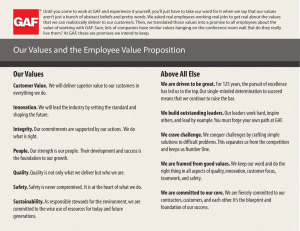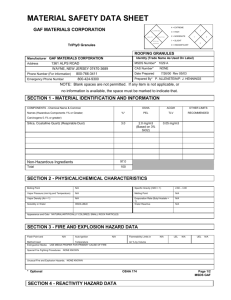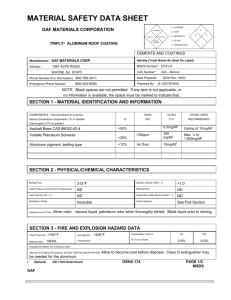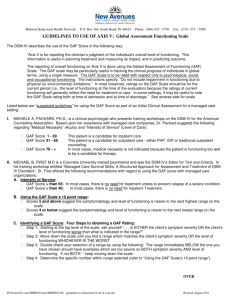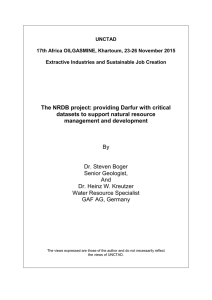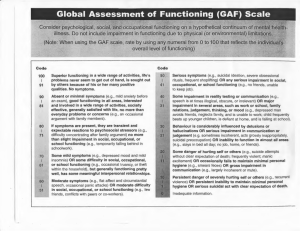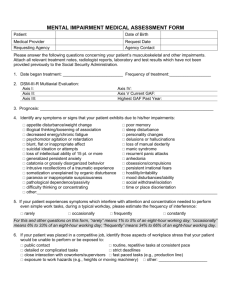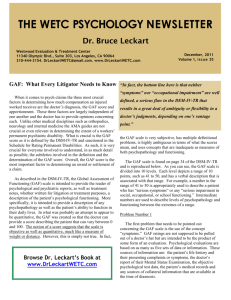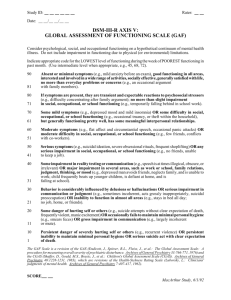Using a Global Assessment of Functioning Score in a Disability
advertisement
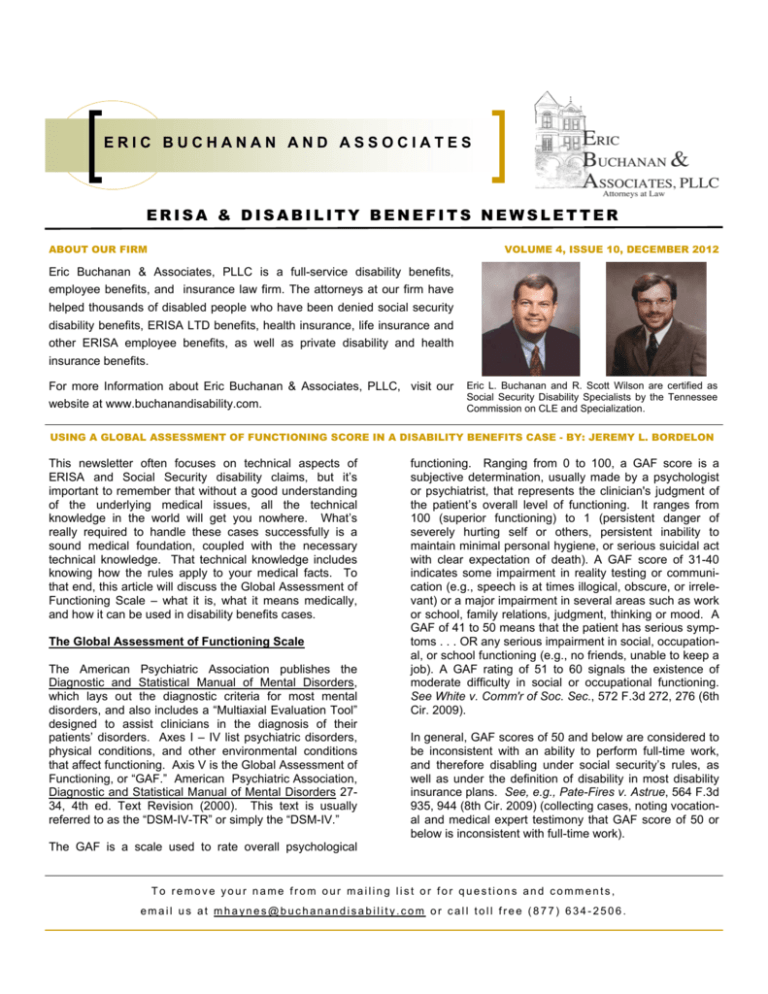
ERIC BUCHANAN AND ASSOCIATES ERISA & DISABILITY BENEFITS NEWSLETTER ABOUT OUR FIRM VOLUME 4, ISSUE 10, DECEMBER 2012 Eric Buchanan & Associates, PLLC is a full-service disability benefits, employee benefits, and insurance law firm. The attorneys at our firm have helped thousands of disabled people who have been denied social security disability benefits, ERISA LTD benefits, health insurance, life insurance and other ERISA employee benefits, as well as private disability and health insurance benefits. For more Information about Eric Buchanan & Associates, PLLC, visit our website at www.buchanandisability.com. Eric L. Buchanan and R. Scott Wilson are certified as Social Security Disability Specialists by the Tennessee Commission on CLE and Specialization. USING A GLOBAL ASSESSMENT OF FUNCTIONING SCORE IN A DISABILITY BENEFITS CASE - BY: JEREMY L. BORDELON This newsletter often focuses on technical aspects of ERISA and Social Security disability claims, but it’s important to remember that without a good understanding of the underlying medical issues, all the technical knowledge in the world will get you nowhere. What’s really required to handle these cases successfully is a sound medical foundation, coupled with the necessary technical knowledge. That technical knowledge includes knowing how the rules apply to your medical facts. To that end, this article will discuss the Global Assessment of Functioning Scale – what it is, what it means medically, and how it can be used in disability benefits cases. The Global Assessment of Functioning Scale The American Psychiatric Association publishes the Diagnostic and Statistical Manual of Mental Disorders, which lays out the diagnostic criteria for most mental disorders, and also includes a “Multiaxial Evaluation Tool” designed to assist clinicians in the diagnosis of their patients’ disorders. Axes I – IV list psychiatric disorders, physical conditions, and other environmental conditions that affect functioning. Axis V is the Global Assessment of Functioning, or “GAF.” American Psychiatric Association, Diagnostic and Statistical Manual of Mental Disorders 2734, 4th ed. Text Revision (2000). This text is usually referred to as the “DSM-IV-TR” or simply the “DSM-IV.” functioning. Ranging from 0 to 100, a GAF score is a subjective determination, usually made by a psychologist or psychiatrist, that represents the clinician's judgment of the patient’s overall level of functioning. It ranges from 100 (superior functioning) to 1 (persistent danger of severely hurting self or others, persistent inability to maintain minimal personal hygiene, or serious suicidal act with clear expectation of death). A GAF score of 31-40 indicates some impairment in reality testing or communication (e.g., speech is at times illogical, obscure, or irrelevant) or a major impairment in several areas such as work or school, family relations, judgment, thinking or mood. A GAF of 41 to 50 means that the patient has serious symptoms . . . OR any serious impairment in social, occupational, or school functioning (e.g., no friends, unable to keep a job). A GAF rating of 51 to 60 signals the existence of moderate difficulty in social or occupational functioning. See White v. Comm'r of Soc. Sec., 572 F.3d 272, 276 (6th Cir. 2009). In general, GAF scores of 50 and below are considered to be inconsistent with an ability to perform full-time work, and therefore disabling under social security’s rules, as well as under the definition of disability in most disability insurance plans. See, e.g., Pate-Fires v. Astrue, 564 F.3d 935, 944 (8th Cir. 2009) (collecting cases, noting vocational and medical expert testimony that GAF score of 50 or below is inconsistent with full-time work). The GAF is a scale used to rate overall psychological To remove your name from our mailing list or for questions and comments, email us at mhaynes@buchanandisability.com or call toll free (877) 634-2506. VISIT US AT WWW.BUCHANANDISABILITY.COM VOLUME 4, ISSUE 10, DECEMBER 2012 - PAGE 2 ERISA & DISABILITY BENEFITS NEWSLETTER The GAF Score in a Social Security Disability Claim to a finding of nondisability.”)). Because GAF scores connote so much more information than the two-digit number implies on its face, it can be argued that they represent the medical opinion of the clinician doing the scoring. The first and most important question in a social security case is whose opinion it is, or more specifically, the credentials of the person giving the opinion. Licensed physicians (M.D.s & D.O.s) and doctoral-level psychologists (Ph.D.s) are considered “acceptable medical sources” under social security regulations for diagnosing medical conditions and offering opinions. 20 C.F.R. § 404.1513. Other sources that provide mental health treatment may include Licensed Clinical Social Workers, masters-degreed psychologists, other licensed counselors, and sometimes lay counselors, depending on the clinical setting. Usually, the source giving a GAF score will have at least a master’s degree and some kind of license, but that is not enough to make the source “acceptable” to social security. Opinions of “unacceptable” sources must be considered, but they don’t receive nearly the same amount of weight from most Social Security Administrative Law Judges (ALJs). The GAF Score in an ERISA or Private Disability Benefits Claim Regardless of the source, there is still considerable dispute over whether a GAF constitutes an actual medical opinion, and not every ALJ accepts a GAF score as an “opinion” in every case. Some cases state that GAF scores need not be addressed at all. See, e.g., Kornecky v. Comm'r, 167 F. App'x 496, 511 (6th Cir. 2006) (holding there is no controlling authority requiring the ALJ to put stock in a GAF score). Other courts hold that the failure to address GAF scores, particularly numerous scores below 50, can be reversible error. Pate-Fires, 564 F.3d at 944. Even though an ALJ may be able to get away with ignoring GAF scores, if he or she pays attention to one such score, the ALJ should treat all GAFs as such. “The ALJ may not ‘cherry-pick’ higher GAF scores in his analysis and ignore GAF scores that may support a disability.” Edwards v. Astrue, 2012 U.S. Dist. LEXIS 44724, 15-17 (N.D. Ohio 2012) (quoting Nieves v. Astrue, 2010 U.S. Dist. LEXIS 16176 (E.D. Pa. 2010)); see also Colon v. Barnhart, 424 F. Supp. 2d 805 (E.D. Pa. 2006) (denial reversed where ALJ mentioned two of the claimant's highest GAF scores but ignored 10 lower scores); Nieves v. Astrue, 2008 U.S. Dist. LEXIS 76110 (D. Colo. 2008) (citing Robinson v. Barnhart, 366 F.3d 1078, 1083 (10th Cir. 2004) (“ALJ is not entitled to pick and choose from a medical opinion, using only those parts that are favorable These cases do not have the same sort of regulatory underpinnings as social security, and convincing an insurer or plan administrator to pay attention to a GAF score may be more difficult than in social security. Unlike social security, there are no hard and fast rules regarding the consideration of medical opinions. Even if you can win an argument that the GAF score constitutes the “opinion” of a professional, the score itself will not be enough to win a case without as much support as possible in the form of treatment notes, prescription records, and anything else available. See, e.g, Boby v. PNC Bank Corp., 2012 U.S. Dist. LEXIS 126693 (W.D. Pa. 2012) (not arbitrary and capricious for ERISA administrator to dismiss GAF score unsupported by other findings). Where appropriately supported, however, a GAF score can be enough to win a case. Zhou v. Metro. Life Ins. Co., 807 F. Supp. 2d 458, 472-473 (D. Md. 2011) (ERISA administrator was arbitrary and capricious in wholly disregarding “GAF score of 32, where any score below 50 shows a serious impairment in functioning, and … statements by Plaintiff's attending physician and social worker supporting a lack of sufficient cognitive function to return to work.”) Also, particularly in ERISA claims, the evidence must receive a “full and fair review” by the administrator. One may be able to argue there was a lack of such full and fair review if numerous sub-51 GAF scores were ignored by the administrator, particularly if those scores were supported by other documentation as described above. Conclusion Ultimately, if a GAF score alone is your best evidence in a case, you may have a problem. A contrary medical opinion, stated in the doctor’s own words, will usually carry more weight than the GAF score. That can be a good thing or a bad thing for your case, of course. However, if the GAF score is consistent with the other clinical evidence, it can be a useful substitute for a more formal medical opinion, or can serve as evidence supporting such an opinion. In any case, it is important to understand what the score means, how it might affect your case, and how you may be able to use it to your client’s advantage. Eric Buchanan & Associates, PLLC 414 McCallie Avenue • Chattanooga, Tennessee 37402 telephone (423) 634-2506 • fax (423) 634-2505 • toll free (877) 634-2506 www.buchanandisability.com
